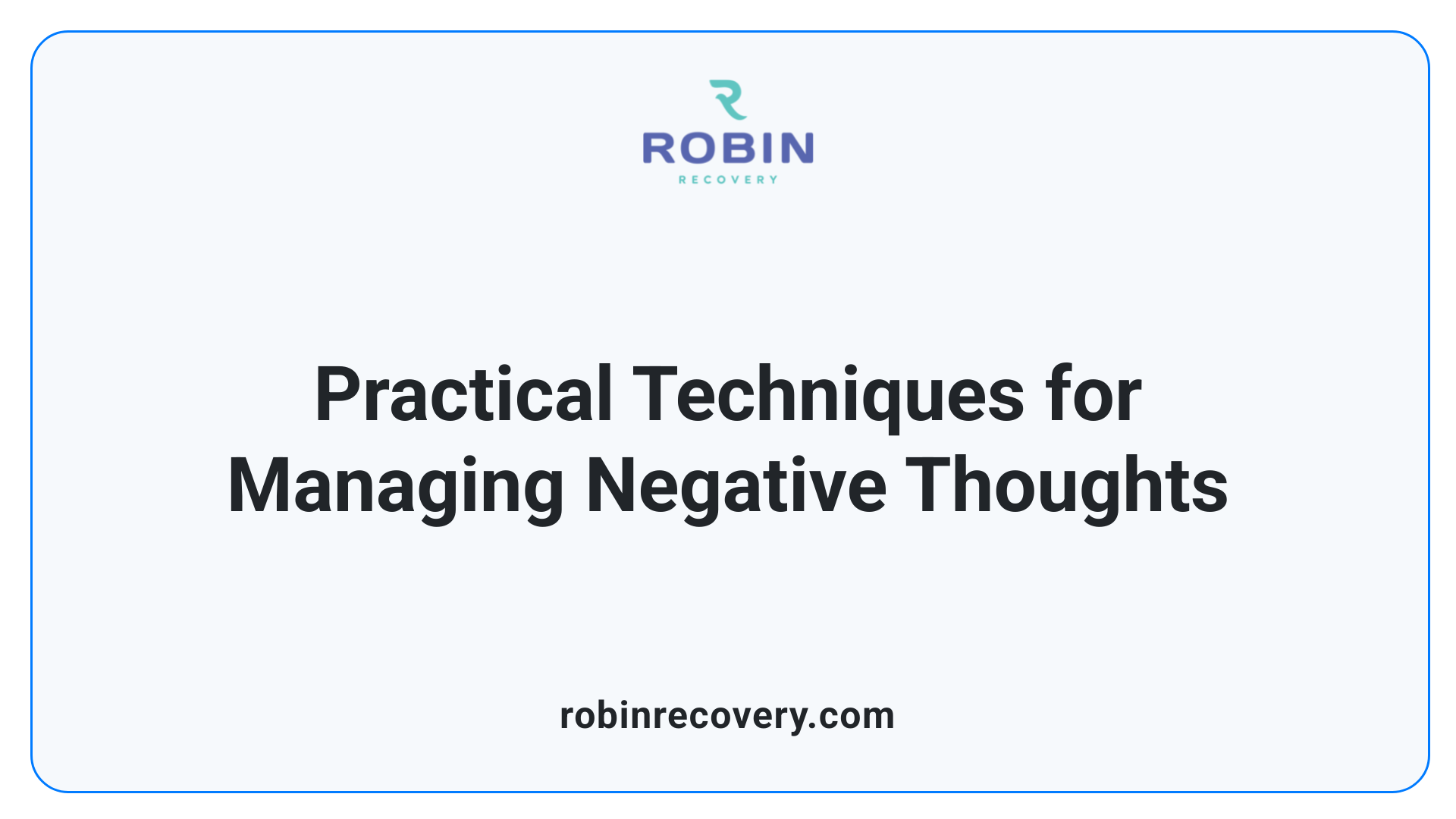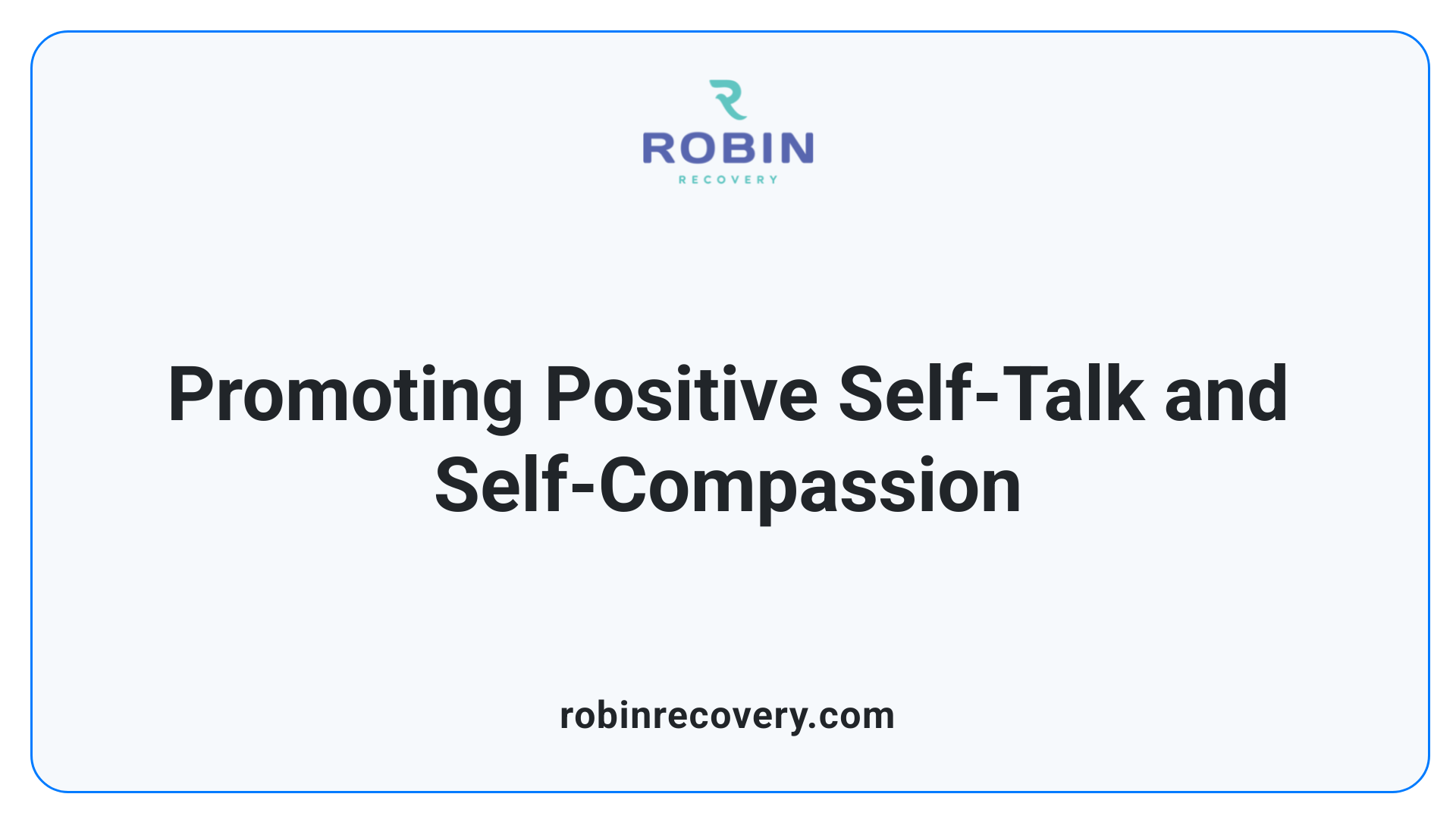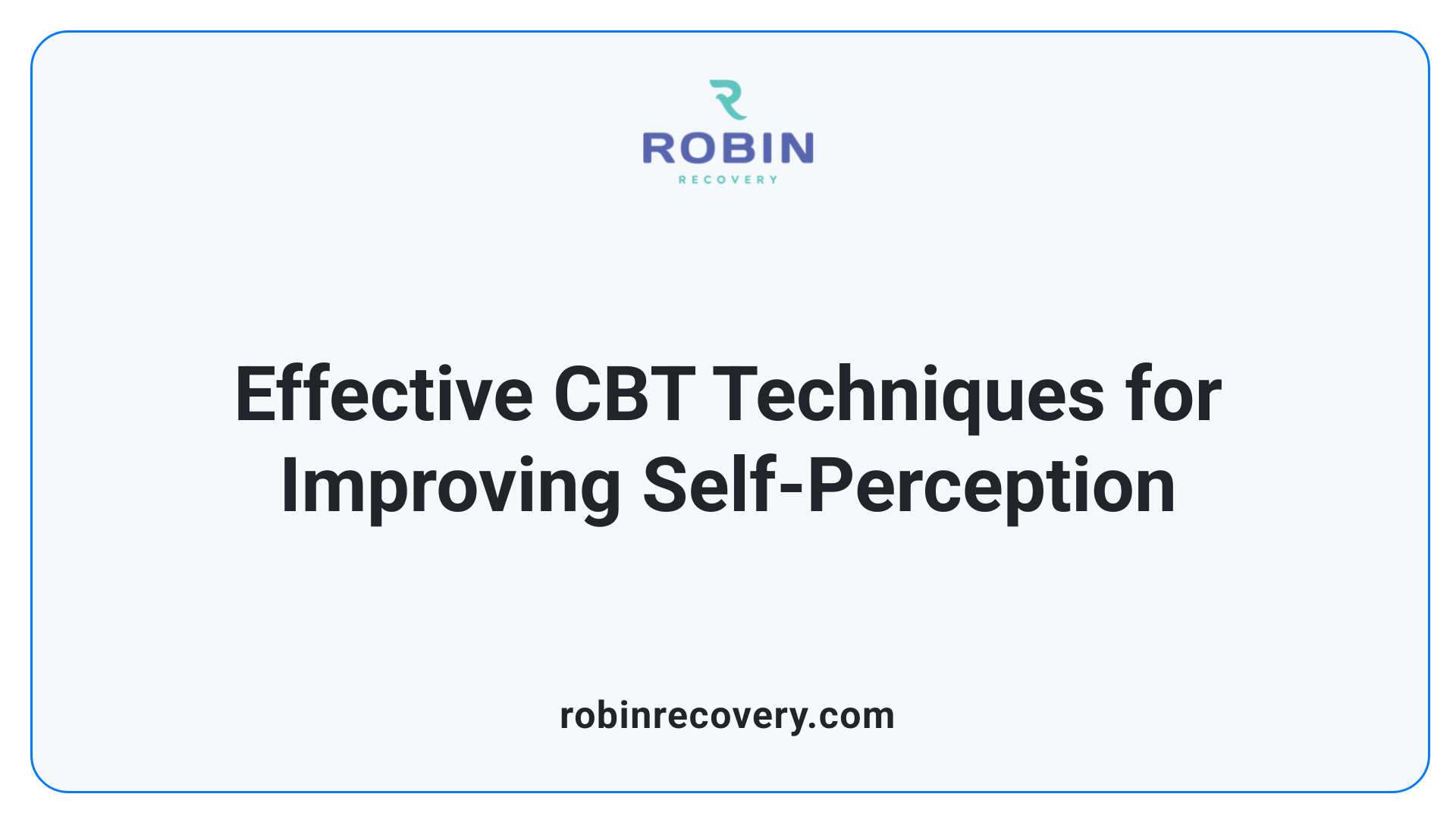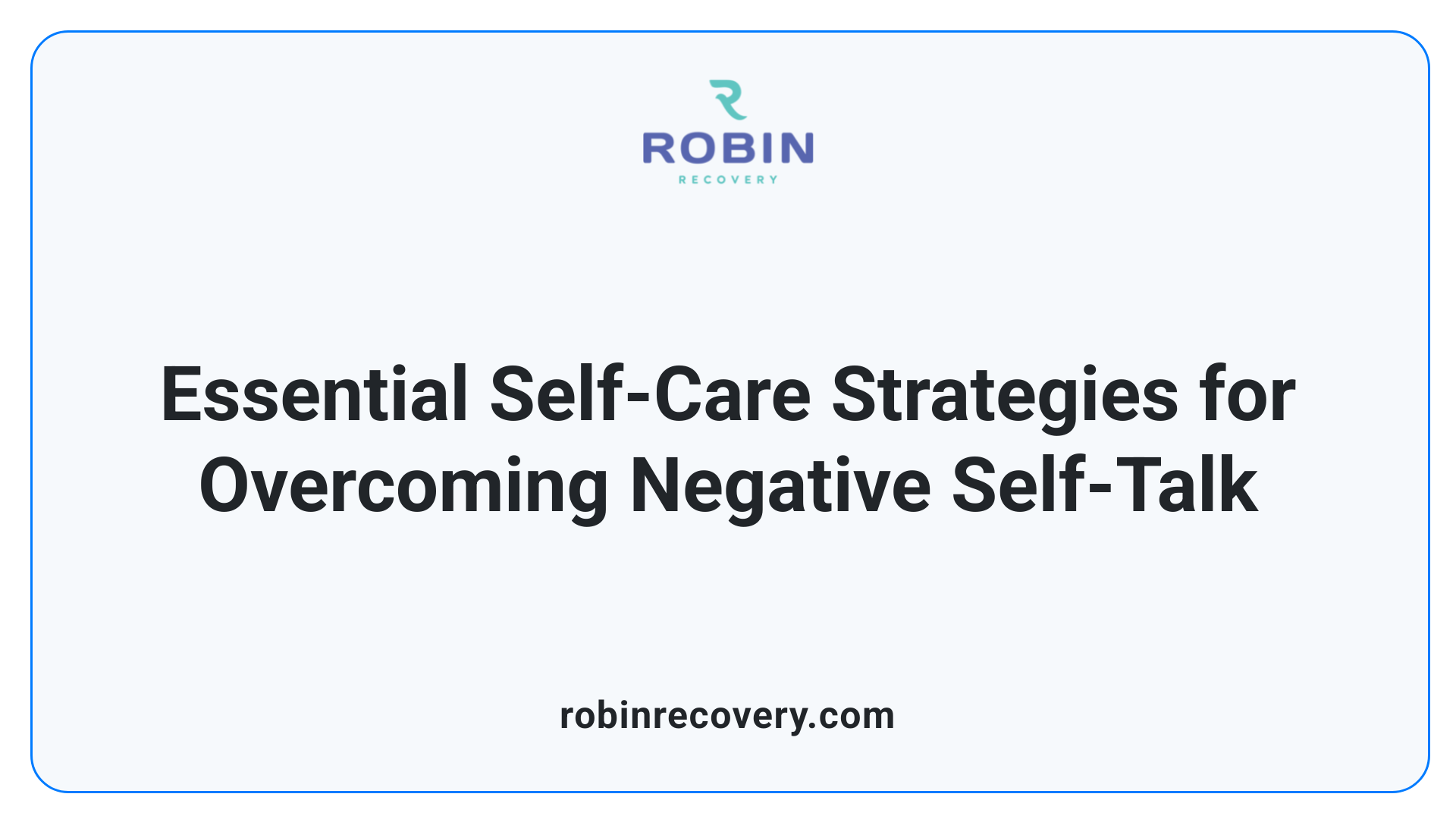How to overcome negative self-talk during addiction recovery

Understanding the Role of Self-Talk in Recovery
In the challenging journey of addiction recovery, negative self-talk can be a formidable adversary. This pervasive inner critic not only undermines self-worth but also threatens progress by fostering feelings of shame, guilt, and hopelessness. Addressing these harmful narratives is crucial, as they can compel individuals towards relapse or inhibit their capacity to embrace a healthier life. This article delves into practical strategies and therapeutic approaches designed to help individuals replace negative self-perceptions with compassionate and constructive self-dialogues.
Impact of Negative Self-Talk on Recovery and Strategies to Counteract It

How can negative self-talk impact addiction recovery?
Negative self-talk can significantly hinder addiction recovery by embedding feelings of inadequacy, hopelessness, and shame into a person's psyche. This detrimental inner dialogue often includes phrases like "I'm going to fail" or "I can't do this," which foster a sense of helplessness and may even justify continued substance use. Such negative thoughts can create a cycle of despair, leading individuals to perceive past relapses as indicators of their future potential, further entrenching them in their addiction.
Consequently, negative self-talk can impact relationships, self-esteem, and ultimately, the motivation to continue on the path of sobriety. When someone continuously tells themselves they are unworthy or unlikely to succeed, it can serve as a precursor to relapse, making it crucial to identify and counter these harmful thoughts.
Techniques to counter negative self-talk
To combat negative self-talk, several effective strategies can be implemented:
- Mindfulness Practices: Engaging in mindfulness and grounding techniques can help individuals stay present, reducing overwhelming negative thoughts.
- Cognitive Behavioral Therapy (CBT): This structured approach teaches individuals to identify and challenge negative thought patterns, replacing them with more constructive beliefs.
- Positive Affirmations: Writing and regularly practicing affirmations, such as "I am capable of change" or "I deserve happiness," can counteract negative beliefs.
- Support Networks: Surrounding oneself with supportive people is vital. Engaging in support groups or talking to counselors can provide encouragement and perspective.
- Self-Care: Prioritizing healthy habits, like nutrition and exercise, contributes positively to emotional well-being, further diminishing negative self-talk's grip.
These methods not only aid in reshaping one's internal dialogue but also enhance overall recovery outcomes.
Managing Negative Thoughts in Recovery

What practical techniques can help manage negative thoughts during addiction recovery?
To navigate the turbulent waters of addiction recovery, it’s essential to employ practical techniques that effectively manage negative thoughts. One of the most beneficial methods is through cognitive-behavioral approaches. This involves identifying and challenging harmful thought patterns that can arise during recovery.
Engaging in mindfulness practices is also crucial. Mindfulness increases self-awareness and enables individuals to recognize automatic negative thoughts as they occur. Additionally, keeping a journal can help track these thoughts, fostering a deeper understanding of one’s inner dialogue.
Practicing gratitude is a powerful way to combat negativity. By focusing on positive experiences, individuals can shift their mindset prominently. Coupled with positive self-talk, these strategies enhance self-esteem, fostering a more optimistic outlook on recovery.
How do mindfulness and goal setting play a role in recovery?
Spending time with supportive people generally contributes positively to mental health during recovery. Surrounding oneself with understanding individuals can significantly alter one’s self-talk, counteracting negativity.
Setting attainable goals is another crucial element in this journey. Small, realistic objectives allow individuals to celebrate meaningful progress, combating pervasive feelings of worthlessness. Moreover, it is vital to reframe negative thoughts and develop resilience; viewing setbacks as learning opportunities can prove invaluable, supporting long-term recovery efforts.
Fostering Positive Self-Talk and Self-Compassion

How can positive self-talk and self-compassion support mental well-being during recovery?
Positive self-talk and self-compassion are essential components of mental health that greatly assist individuals during addiction recovery. Positive self-talk involves reframing negative thoughts into supportive and encouraging affirmations. This shift enhances self-esteem and resilience, which are vital for maintaining a positive mindset throughout recovery. For instance, replacing a thought like "I’m not good enough" with "I am capable of growth and change" can boost one's confidence significantly.
Self-compassion complements this process by allowing individuals to acknowledge their struggles without harsh self-judgment. This practice reduces the shame and guilt often associated with addiction, fostering a more forgiving internal dialogue. By being kind to oneself, individuals improve their emotional regulation and establish healthier coping mechanisms.
When both positive self-talk and self-compassion are cultivated, they empower individuals to confront challenges with a supportive mindset. They encourage celebrating small victories and maintaining motivation, ultimately fostering a more fruitful recovery journey.
Techniques to Promote Positive Self-Talk and Self-Compassion
- Practice affirmations daily, such as "I am strong" or "I deserve happiness."
- Journal to reflect on positive experiences and personal strengths.
- Engage in mindfulness techniques to stay present and counter negative spirals.
- Consider therapy, where techniques like Cognitive Behavioral Therapy can help challenge negative beliefs.
By integrating these practices into their daily lives, individuals can enhance their overall mental well-being and promote lasting recovery.
Cognitive Behavioral Techniques for Better Self-Perception

What cognitive behavioral techniques are effective for improving self-perception in addiction recovery?
Cognitive Behavioral Therapy (CBT) provides a toolbox of techniques aimed at nurturing a healthier self-perception during addiction recovery. By focusing on identifying and restructuring negative thought patterns, individuals can confront and challenge harmful beliefs that detract from their self-worth. Common techniques include:
- Journaling: Documenting negative thoughts helps uncover patterns and triggers. This process not only raises awareness but also facilitates self-reflection and understanding.
- Exposure exercises: These are designed to gradually confront fears or insecurities. Facing these challenges helps diminish their power and reinforces self-confidence.
- Mindfulness training: Engaging in mindfulness practices allows individuals to stay present and reduce anxiety related to negative self-talk. This approach encourages self-acceptance and promotes a compassionate attitude towards oneself.
- Seeking feedback from trusted individuals: Gaining insights from supportive friends or mentors provides a balanced perspective of one's strengths, contributing to improved self-perception.
Incorporating these CBT strategies in recovery not only fosters resilience but also assists individuals in reshaping their narratives toward a more constructive self-image.
TechniqueDescriptionBenefits Journaling Documenting thoughts for awareness and insight Uncovers patterns, enhances self-reflection Exposure exercises Gradual confrontation of fears and insecurities Reduces anxiety, boosts confidence Mindfulness training Staying present, reducing negative thought impact Increases self-acceptance Seeking supportive feedback Gaining insights from trusted sources Improves perception of strengths
Ultimately, these CBT techniques promote not just recovery but a refined, more positive self-view that can last a lifetime.
Self-Care Essentials for Addressing Negative Self-Talk

What self-care strategies can help address negative self-talk during addiction recovery?
Addressing negative self-talk is crucial in addiction recovery, as it can lead to feelings of worthlessness and hinder progress. A holistic approach to self-care can significantly help mitigate these harmful thoughts.
- Mindfulness and Awareness: Practicing mindfulness through meditation can enhance awareness of negative thoughts. Journaling can also serve as a useful tool to document and challenge these thoughts early on. This awareness is the first step toward managing self-talk more effectively.
- Regular Physical Exercise: Engaging in consistent physical activity boosts mood and improves self-esteem. This can also counteract feelings of anxiety and depression, making recovery more manageable.
- Healthy Eating: A balanced diet contributes to overall well-being. Proper nutrition fuels the body and can influence emotional stability, thus enhancing a positive self-image.
- Adequate Sleep: Ensuring sufficient rest is vital. Quality sleep can significantly affect mood and cognitive function, allowing individuals to better handle stress and negative thinking.
- Cognitive Behavioral Therapy (CBT): This therapy helps individuals identify and challenge distorted thinking patterns, creating healthier thought processes.
- Surrounding Yourself with Positive People: Engaging with supportive individuals fosters encouragement and positivity, further impacting self-talk.
- Practicing Positive Self-Talk: Using affirmations and talking to oneself kindly can help in reshaping negative beliefs.
- Gratitude Journals: Keeping a gratitude journal helps focus on positive experiences, reinforcing a balanced perspective during recovery.
By integrating these self-care strategies, individuals can effectively counter negative self-talk, paving the way for a successful recovery journey.
Cultivating Resilience and Growth Through Recovery
How can individuals build resilience during addiction recovery by viewing setbacks as opportunities for growth?
Building resilience during addiction recovery involves reframing setbacks not as failures, but as opportunities for growth and learning. This shift in perspective encourages individuals to view challenges as integral to their recovery journey, fostering patience and perseverance.
Effective techniques to aid this process include:
- Reflective Journaling: Documenting thoughts and feelings can clarify experiences and highlight patterns, making it easier to learn from them.
- Setting Realistic Expectations: Avoiding perfectionism helps manage disappointment and establishes attainable goals, contributing to a sense of accomplishment.
- Engaging in Therapy: Cognitive-Behavioral Therapy (CBT) is particularly valuable for developing tools to manage stress and navigate adversity effectively.
Furthermore, emphasizing personal strengths and celebrating even small victories can enhance self-esteem. Staying connected to a supportive community not only reinforces resilience but also ensures individuals are reminded they are not alone in their struggles. Through these practices, individuals can cultivate resilience, setting a solid foundation for sustained recovery success.
Conclusion: Empowerment Through Positive Change and Support
Achieving lasting recovery requires transforming the way individuals speak to themselves. By moving away from negative self-talk towards a self-narrative filled with positivity and self-compassion, individuals can reinforce their self-worth and secure their recovery journey. Utilizing tools like mindfulness, CBT, and self-care strategies paves a path towards empowerment, encouraging a life where self-belief and mental well-being thrive. Embracing this transformation nurtures resilience and resilience fosters sustained recovery, ultimately leading to a healthier, more fulfilling life free from the bonds of addiction.
References
- Negative Self-Talk in Recovery | Pinnacle Treatment Centers
- Why Positive Self-Talk is Essential in Addiction Recovery
- How Negative Self-Talk Keeps You from Recovery - Addictions
- How to Overcome Negative Thoughts in Recovery | South Coast
- Moving Beyond Negative Thinking During Recovery
- Are You Talking Yourself Right into Addiction? - The Recovery Village
- 11 Negative Thoughts to Overcome | Spirit Mountain Recovery
- Self-Talk's Role in Addiction Relapse - Awakening Recovery Center
- Rehab 101 – Countering Negative Self-Talk in Recovery
- How To Combat Negative Self-Talk in Drug Rehab
